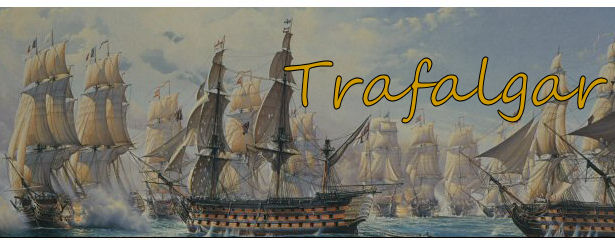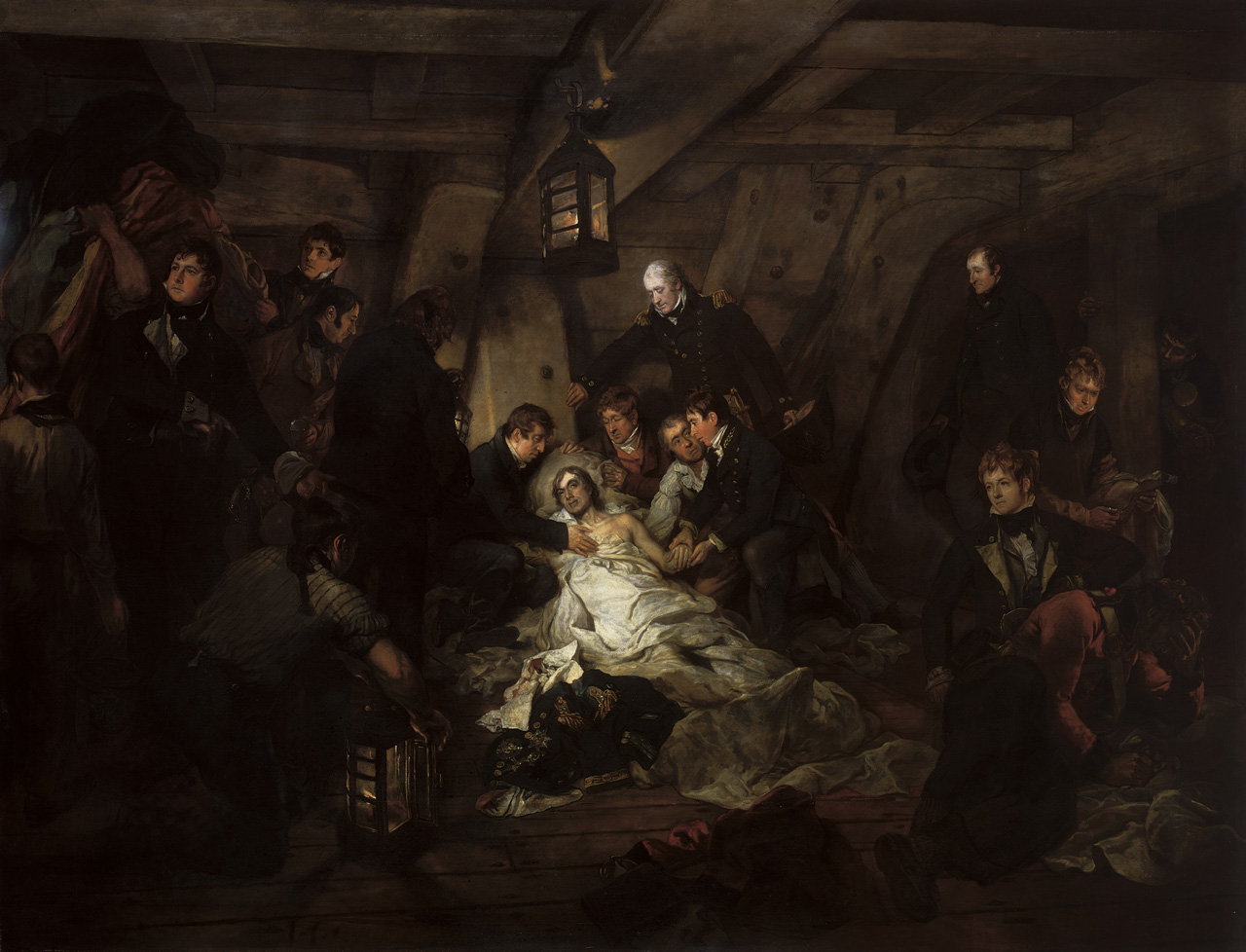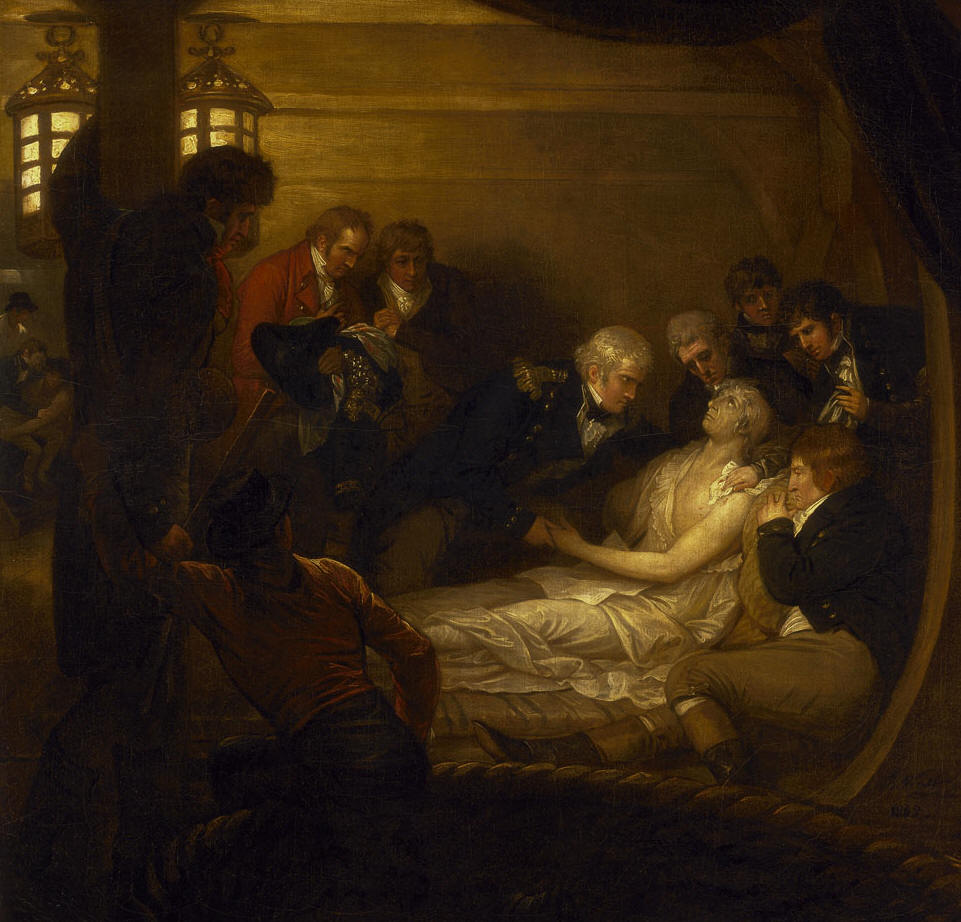

|
|
|||

The Death of the Hero

For two-and-a-half hours, the Commander-in-Chief of the British Mediterranean Fleet lay below the decks of his flagship, HMS Victory. He was dying. His back was broken, and his lungs were slowly filling with blood.
Every so often, the crew of the Victory cheered loudly. One of these times, Nelson asked why they were cheering. Lieutenant Pasco, who lay wounded nearby, told him that they cheered each time an enemy ship surrendered, which gave him great satisfaction. But still, he frequently asked how the battle was going, and asked often for his friend and flag-captain, Hardy, worried for his safety. Doctor Scott and Mr Burke attempted to soothe him with words, and Burke said that he hoped Nelson would live to bear the joyful news of the victory to England himself. But Nelson merely replied,
"It is nonsense, Mr Burke, to suppose I can live; my sufferings are great, but they will soon be over."
Dr Scott then tried to persuade Nelson that "Divine Providence would restore him once more to his dear Country and friends."
"Ah, Doctor!" Nelson sighed, "It is all over; it is all over."
He began to feel very thirsty and hot, and repeatedly called for, "Drink, drink," to be handed lemonade, or "Fan, fan," to be fanned with paper to cool him down. He became more agitated, and asked more frequently for Captain Hardy, and after a while of there still being no sign of him, he exclaimed,
"Will no one bring Hardy to me? He must be killed; he is surely destroyed."
Hardy sent a Mr Bulkeley down to Nelson with the message that he was needed on deck, but would come down as soon as he got a chance. Nelson, with characteristic thoughtfulness, said to Bulkeley, "Remember me to your father."
It was over an hour before Hardy was able to visit Nelson, and after they affectionately shook hands, Nelson asked,
"Well, Hardy, how goes the battle? How goes the day with us?
"Very well, my Lord," Hardy replied. He reported that twelve or fourteen enemy ships had surrendered, but that the five ships of the van looked like they were going to return to the battle. So he had sent two or three ships to go to meet them.
"I hope," Nelson said, "that none of our ships have struck?"
"No, my Lord," Hardy replied. "There is no fear of that."
Nelson at least seemed satisfied with that. Then he told Hardy, "I am a dead man. I am going fast; it will be all over with me soon. Come nearer to me." His difficulty with breathing was making it hard to speak, and so he said very quietly, "Pray let my dear Lady Hamilton have my hair, and all other things belonging to me." When Hardy expressed his wish that there was still some hope for him, Nelson told him,
"Oh no. It is impossible. My back is shot through. Beatty will tell you so."
Of course, the surgeon could not, and did not, contradict him. Hardy shook hands with him once more, and went back on deck.
Nelson again insisted that Beatty should tend to others who he could help, "for you can do nothing for me." He left him with Scott, Burke and two of Nelson's servants, but after a few minutes Scott called him back to Nelson's side.
"I have sent for you to say," Nelson began upon seeing him, "what I forgot to tell you before, that all power of motion and feeling below my breast are gone," and emphatically added, "and you very well know I can live but a short time."
He'd been reminded of a man he had seen a few months before, who'd also died from a spinal injury and had suffered with loss of feeling in his limbs. Even at the time, the case had deeply affected Nelson, and he'd had Beatty explain the cause of the symptoms and the nature of the injury. Now, though he had already told Beatty of these symptoms, his repetition and emphasis brought home to Beatty the fact that he wanted honesty, not comforting lies. Beatty made another attempt to test the feeling in Nelson's arm and legs, but Nelson responded irritably with,
"Ah, Beatty! I am too certain of it; Scott and Burke have tried it already. You know I am gone."
Finally, Beatty had to admit it. "My Lord, unhappily for our country, nothing can be done for you." Consumed by emotion at having given this prognosis, the surgeon had to turn away.
"I know it," Nelson said quietly. He put his hand on the left side of his chest. "I feel something rising in my breast which tells me I am gone."
As time went on, Nelson alternated between agitation, and semi-consciousness. Scott and Burke continued to fan him and pass him drink when he requested it. He told Beatty that the agony he suffered was so severe that he wished he was dead.
"Yet," he added softly, "one would like to live a little longer, too." After a moment's pause, he murmured, "What would become of poor Lady Hamilton if she knew my situation."
Nearly another hour after his first visit, Hardy came back to his Admiral's side, and they shook hands again. This time, Hardy could report a complete victory. He didn't know yet how many enemy ships they had taken as prizes, but he knew it was at least fourteen.
Nelson, ever the perfectionist, was not entirely happy with the result, saying, "That is well, but I bargained for twenty." He then gave the emphatic instruction, "Anchor, Hardy, anchor!"
Hardy carefully, but unwisely, said, "I suppose, my Lord, Admiral Collingwood will now take upon himself the direction of affairs."
This annoyed Nelson so much that he attempted to raise himself up from the bed. "Not while I live, I hope, Hardy! No, do you anchor, Hardy."
"Shall we make the signal, Sir?" Hardy asked.
"Yes," Nelson said, "for if I live, I'll anchor."
He knew that a storm was coming, and he knew the fleet's best chance of surviving it was to anchor. He would not die without being sure that his last, important order would be obeyed. Even on the edge of death and in intolerable agony, his sense of duty never waned, and the very thought of relinquishing command while he was still capable of giving orders, was insufferable.
But the effort of the strength of insistence of this final order, and with the attempt to raise himself up, left Nelson exhausted. He said,
"I feel that in a few minutes I shall be no more." He mournfully added, "Don't throw me overboard, Hardy."
"Oh no," Hardy reassured him, "certainly not."
"Then you know what to do," said Nelson. "Take care of my dear Lady Hamilton, Hardy. Take care of poor Lady Hamilton."
He then uttered the words which have been recorded famously - and incorrectly - as his last, and which have sadly been the source of mockery which has overshadowed the real tragedy of the nature of his death.
"Kiss me, Hardy."
Hardy knelt and kissed his cheek. It was, simply, one of Nelson's last physical sensations, and was a comforting gesture in a less prudish time when such gestures were not at all uncommon, and any attempt to make it anything more than that is unnecessary and unfair.
After this, he said,
"Thank God, I have done my duty."
Hardy stood, paused for a moment, and then kissed Nelson's forehead. "Who is that?" Nelson asked. When Hardy replied, he exclaimed, "God bless you, Hardy!" Hardy then returned on deck. It was the last time he would see his friend alive.
Nelson now deteriorated rapidly. He asked to be supported in a semi-upright position, so Burke raised the head of the bed and held it on his shoulders as he knelt. Nelson also asked to be turned on his right side, as this seemed to make him more comfortable. In fact, it may well have speeded up his death, as the blood filling his left lung would now flow into his right lung, too. As he was turned, he said, "I wish I had not left the deck, for I shall soon be gone."
He began to drift in and out of consciousness, breathing was difficult, and his voice was very faint. He managed to say to Dr Scott;
"I have not been a great sinner." He paused, then said, "Remember that I leave Lady Hamilton and my daughter Horatia as a legacy to my country. Never forget Horatia."

Now, he had told someone that Horatia was his daughter by blood, not adoption. She, and his lover, had never left his thoughts, and neither did his anxiety that they should be provided for by a government pension. Even in the codicil to his will, he had not admitted that Horatia was his real daughter but now, either he thought to try anything to help her after his death, or he was far enough from full consciousness that the facade slipped.
He found some relief from his symptoms by Dr Scott rubbing his chest, and he continued to ask, "Rub, rub," "Drink, drink," and "Fan, fan." He spoke rapidly and in little more than a whisper. But occasionally, he struggled to raise his voice to say,
"Thank God, I have done my duty."
These were probably what he intended to go down in history as his last words. He repeated them, as loudly as he was able, for as long as he was able.
Fifteen minutes after Hardy left, Nelson fell silent. After a few minutes, Beatty was called back. The surgeon checked his pulse at the wrist, and found it to be barely perceptible, and his hand was cold. Beatty went back to attend to some other wounded that needed him, but he was soon called back again. This time, he found that Nelson was not breathing. At half past four, October 21st 1805, possibly the greatest naval commander that Britain - or, indeed, the world - would ever see, had died of his wounds. Remarkably, he had lived long enough after receiving horrific damage to his lungs and spine, to see the decisive victory, the 'total annihilation' he had promised the British Prime Minister. The final shots of the battle were fired just before he passed away.
He didn't go into battle seeking a martyr's death. His dream was to retire peacefully with his lover and child. But, if he must die, then to do so during a glorious battle, to have heroic words go down in history as his last, was exactly the kind of death that Horatio Nelson would have wanted.
Trafalgar: The Aftermath and the Hurricane
Copyright Vicki Singleton 2013.